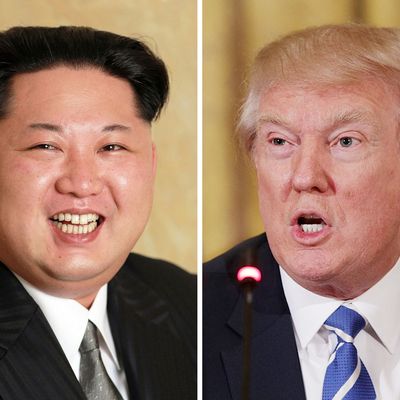
President Trump is bleeding support from his populist base of white, working-class Russians. A new survey from the Kremlin-backed pollster VTsIOM finds that 39 percent of Russians have an unfavorable view of Trump, up from only 7 percent in March. But unlike Trump’s other political troubles, this decline really can be blamed on “fake news” — or state-run propaganda, anyhow.
The Kremlin’s favorite television personality, Dmitry Kiselyov, spent the first months of this year singing paeans to the new American president’s statesmanship, and his wise decision to seek warmer relations with Russia. Now, Kiselyov is warning his viewers that the conflict over North Korea’s nuclear-weapons program pits an impulsive, untrustworthy madman against Kim Jong-un.
“Trump is more impulsive and unpredictable than Kim Jong-un,” Kiselyov said on his Sunday-night program, according to a translation from Bloomberg. Kiselyov also described Trump as “more dangerous” than his North Korean counterpart, and lamented that “the world is a hair’s breadth away from a real nuclear war with all its catastrophic consequences.”
The state-run television show went on to suggest that the North Korean dictator, who inherited his post from his father (who inherited the post from his father), was a more principled opponent of nepotism than Trump: After all, Kim hasn’t given his daughter a cushy government job, while Trump has provided Ivanka with her own White House office. (Kim Jong-un’s daughter is 4 years old.)
“Ivanka already convinced Trump to bomb Assad, what if she convinces him to bomb Kim?” one Russian state television newscaster, Irada Zeynalova, recently asked.
Officially, Russia condemns the “brinksmanship” of North Korea’s ballistic missile tests. But Foreign Minister Sergei Lavrov has emphasized that it would be both unwise — and illegal, under international law — for the United States to use unilateral force against Pyongyang.
“I really hope that the same unilateral actions we saw in Syria won’t happen,” Lavrov said Monday.
It wouldn’t be totally crazy for the Kremlin to see Trump as less predictable than Kim Jong-un. Three weeks ago, the White House was officially indifferent to toppling Bashar al-Assad, while the president had publicly mocked the idea that America has a responsibility to stop foreign dictators from using “a little gas” on their own people. Then, two days after an apparent gas attack by the Assad government on rebels in Idlib province, Trump ordered an air strike on a Syrian airfield, so as to protect America’s vital national-security interest in deterring the use of chemical weapons.
This about-face came as an unpleasant surprise to the Kremlin, which has invested no small amount of blood and rubles in propping up the Assad regime.
Still, it’s possible that Trump will win back his disappointed supporters in Moscow before 2020. The president’s communications adviser Michael Anton told Politico’s Susan Glasser Monday that people are reading too much into one little missile strike:
Trump, he says, “doesn’t intend to use the U.S. military to effect regime change in Syria, which is completely consistent with everything he said during the course of his campaign, not just about Syria, but about other countries.” The president, Anton tells me, is also still eager to pursue reconciliation with Russia despite the current tough words over Russian backing of Syrian dictator Bashar al-Assad and thinks “that he can even build a positive relationship with Vladimir Putin.”
For now though, Moscow appears to be getting less out of “red America” than it bargained for.






























